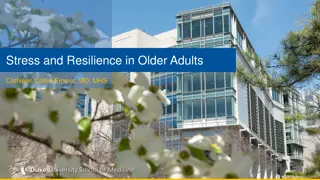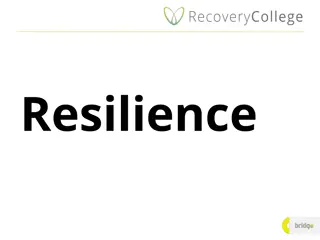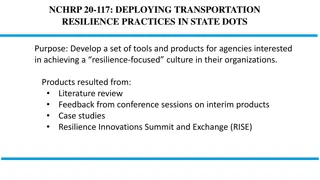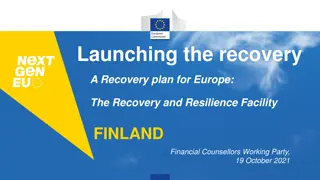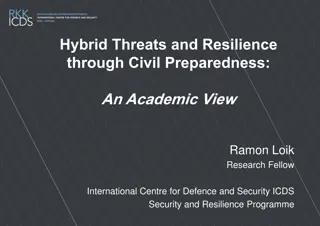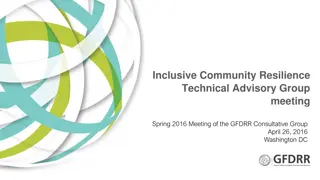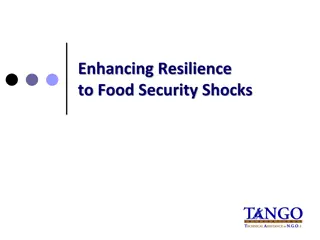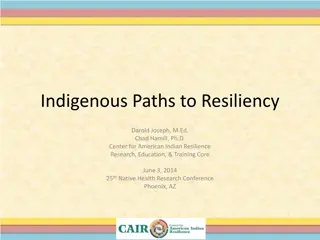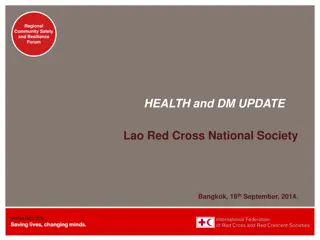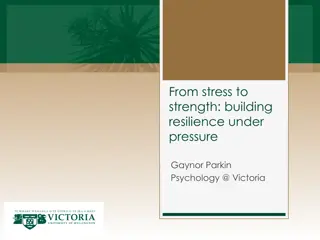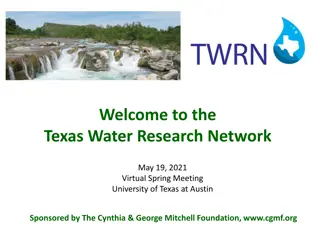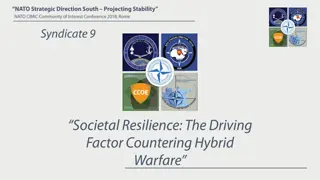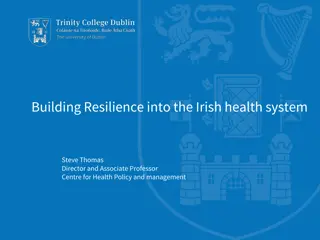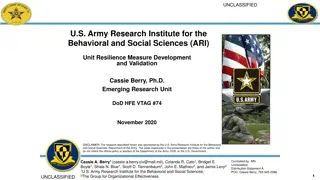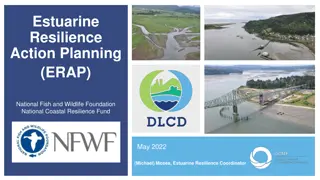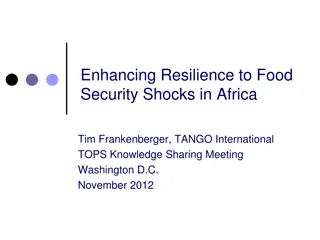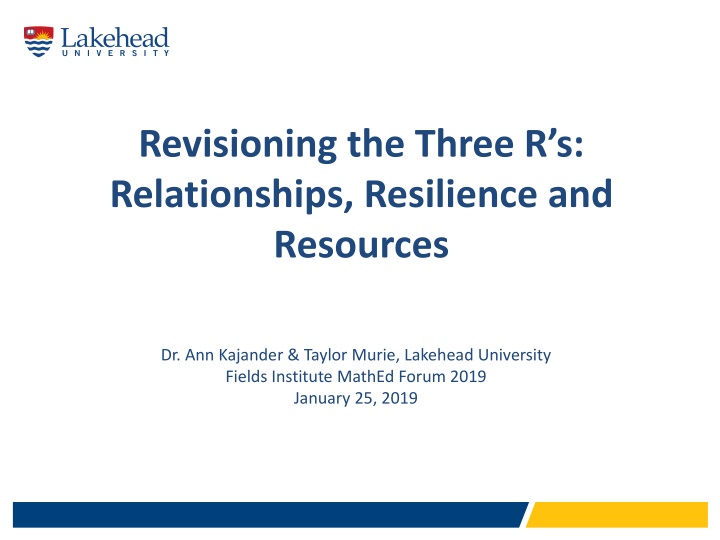
Empowering Education in Northwestern Ontario: Insights and Initiatives
Exploring challenges and innovations in education in Northwestern Ontario, focusing on factors influencing student outcomes, locally developed mathematics, and general learning strategies like GLS Transitions. Discover the efforts to enhance learning experiences and support student success in the region.
Download Presentation

Please find below an Image/Link to download the presentation.
The content on the website is provided AS IS for your information and personal use only. It may not be sold, licensed, or shared on other websites without obtaining consent from the author. If you encounter any issues during the download, it is possible that the publisher has removed the file from their server.
You are allowed to download the files provided on this website for personal or commercial use, subject to the condition that they are used lawfully. All files are the property of their respective owners.
The content on the website is provided AS IS for your information and personal use only. It may not be sold, licensed, or shared on other websites without obtaining consent from the author.
E N D
Presentation Transcript
Revisioning the Three Rs: Relationships, Resilience and Resources Dr. Ann Kajander & Taylor Murie, Lakehead University Fields Institute MathEd Forum 2019 January 25, 2019
Education in Northwestern Ontario 41.3% of Thunder Bay students met the provincial standard in Grade 9 Applied mathematics (provincial average is 46%). Deer Lake Eabametoong (Fort Hope) Whitesand Locally Developed mathematics enrolment is larger than the provincial average. Government of Ontario. (2018, December). School information and student demographics. Retrieved from https://www.ontario.ca/data/school-information-and-student-demographics Vector Stock. (n.d.). Ontario province map [Map]. Retrieved from https://www.vectorstock.com/royalty-free-vector/ontario-province-map-vector-2934869
Factors Influencing Education in the North CBC News: The National. (2017, November 13). First Nations families weigh children s education vs. safety [Video file]. Retrieved from https://www.youtube.com/watch?v=x9iTBSPSE3U
Factors Influencing Education in the North CBC News: The National. (2017, November 13). First Nations families weigh children s education vs. safety [Video file]. Retrieved from https://www.youtube.com/watch?v=x9iTBSPSE3U
Locally Developed Mathematics (LDM) Implications of lack of provincial testing Individualized curriculum(?) Minimal resources available Larger range of student abilities than in any other course Students face difficult external factors
General Learning Strategies (GLS) Transitions Pilot project on recommendation of one school s department head The goal is closing literacy and numeracy gaps for students transitioning to Grade 9 Focus on social and behavioural aspects of high school Acts as a safe space for those who would like to pursue an Applied or LDM credit, but are overwhelmed by the classroom environment Course starts with 0 enrolment, and teacher invites those students who need this space Runs at the same time as Grade 9 LDM, Applied and Academic classes so possible transfer is easy
Research Context We have been developing relationships with students and teachers for 2 years. Estimated total of classroom observation and participation hours: 230 Observed and participated in 3 Grade 9 LDM courses and 2 GLS courses amongst 3 researchers, at least on a weekly basis BACP. (n.d.). Research resources [Image]. Retrieved from https://www.bacp.co.uk/events-and-resources/research/
Research Questions 1. How can teachers be better supported to deliver the Grade 9 Locally Developed and transitions courses to these high needs students? 2. How do student needs align or differ with those in other mathematics courses? 3. Does the introduction of Indigenized and decolonized mathematics content increase student engagement in these courses, and if so, how?
Relationships Teacher-student relationships are critical to success in Grade 9 LDM [Relationships are] very important, I think that s half of it. If the kids know that you truly care about them and you want their best interest then the kids will be more willing to do things for you, they ll feel comfortable with you. You don t realize what impact you re having on them at the time and sometimes you re like I don t feel like I m doing anything . But sometimes after the fact when you have conversations with them after and they come up to you or because it s hard to really reflect while you re in the moment if you have made a difference (Interview 2: Janice) IconFinder. (n.d.). Account, add, business, connection, file, link, network, icon [Image]. Retrieved from https://www.iconfinder.com/icons/327729/account_add_business_connection_file_link_network_icon
Resilience Resilience refers to the capacity to return to good mental health after challenging and difficult situations (Hurlington, 2010, p.1). Well realizing that in the end, the math is important but sometimes if it s just getting them into the building, into the room and making them feel like it s a good place just trying to know that I care about them and I ll help them in any way I can. I can t change a lot of it but I can be a positive supportive person while they re here at school (Interview 2: Janice) Hurlington, K. (2010, February). Bolstering resilience in students: Teachers as protective factors. What Works? Research Into Practice. Retrieved from http://www.edu.gov.on.ca/eng/literacynumeracy/inspire/research/WW_bolstering_students.pdf
Resource Development Quality resources are important, but are not nearly enough. One massive, massive, massive thing is more support in the classrooms. That s desperately needed. One teacher is not enough. The teacher needs the support emotionally, mentally and the students, we need support for more of our students. The way that support funding is right now, basically, you have to have a student that is behavioural. You could have an entire classroom full of IEPs and no one to help. And you re just one person. That s just with the IEPs. (Interview 2)
Resources Birch bark basket making collaboration Traditional travel workshop Canada 150 Rubber Duck Task Tim Horton s Roll Up the Rim Task Hockey rates and ratio task Flyer shopping activity Blue whale ratio lesson Driveway paving learning & assessment tasks Meyer, D. (n.d.). 3 Act Mathematics Tasks. Retrieved from: https://tapintoteenminds.com/3act-math/
Conclusions The only take-away that is transferable, for these kids in these courses, is the relationships piece without that you have nothing. And every day is different. (department head interview)
References BACP. (n.d.). Research resources [Image]. Retrieved from https://www.bacp.co.uk/events-and- resources/research/ CBC News: The National. (2017, November 13). First Nations families weigh children s education vs. safety [Video file]. Retrieved from https://www.youtube.com/watch?v=x9iTBSPSE3U Government of Ontario. (2018, December). School information and student demographics. Retrieved from https://www.ontario.ca/data/school-information-and-student-demographics Hurlington, K. (2010, February). Bolstering resilience in students: Teachers as protective factors. What Works? Research Into Practice. Retrieved from http://www.edu.gov.on.ca/eng/literacynumeracy/inspire/research/WW_bolstering_students.pdf IconFinder. (n.d.). Account, add, business, connection, file, link, network, icon [Image]. Retrieved from https://www.iconfinder.com/icons/327729/account_add_business_connection_file_link_network_icon Meyer, D. (n.d.). 3 Act Mathematics Tasks. Retrieved from: https://tapintoteenminds.com/3act-math/ Vector Stock. (n.d.). Ontario province map [Map]. Retrieved from https://www.vectorstock.com/royalty- free-vector/ontario-province-map-vector-2934869
Acknowledgements Matthew Valley & Kelly Sedor Dr. Joe Flessa, University of Toronto SSHRC Mathematics Knowledge Network This research was supported by the Social Sciences and Humanities Research Council of Canada The MKN is funded by the Ontario Ministry of Education. The MKN is a KNAER Project, hosted by the Fields Institute for Research in Mathematical Sciences. The views expressed in this presentation belong to the authors and do not necessarily reflect the opinions of the Ministry of Education nor the Ontario government.



